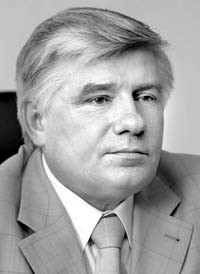On February 14 Ukraine’s State Property Fund chairman Mykhailo Chechetov admitted that there were “procedural violations in restricting the competition during the privatization of Kryvorizhstal.” Now, Chechetov says, the government’s policy is to nationalize this asset and put it up for sale, “opening all doors to competition and clearing the way for foreign capital from neighboring countries and overseas.” According to Chechetov, the reprivatization of the steelworks will be conducted in line with the strictest of legal procedures if this case goes to court and if the court orders the payment of compensation to investors. Chechetov went on to say that “the more such assets are marked for reprivatization, the worse it will be for the country’s investment image.”
This conclusion dominated a recent roundtable discussion entitled “The Benefits and Hazards of Reprivatization,” held at the International Center for Future Studies. The roundtable organizers approached this issue in a professional manner and carefully listed all the pros and cons. Notably, half of the benefits they named were labeled “potential”: a potential increase in budget revenues, potential transparency of repeat tenders, etc.
Chechetov repeatedly cited President Yushchenko, who has said that “reprivatization will never be promoted to the level of a government policy in Ukraine.” Yet experts have pointed out that the lack of criteria defining “illegal privatization” signals the probability that other privatization deals, and not only those that were concluded before the presidential elections, might be revised. They also predict that a large part of the business community will not welcome reprivatization, which might worsen the investment climate or even lead to a crash of the country’s stock market. It also seems likely that the nation’s leading industrial and financial groups will block any reprivatization or privatization tenders, and that the quality of political and economic competition will be degraded to the point that old methods will be used to pressure the opposition.
People’s Deputy Liudmyla Kyrychenko, a member of the ad hoc Parliamentary Commission on Privatization, also argued with the State Property Fund chairman. She recalled that in Donetsk President Yushchenko mentioned 150 strategic enterprises that will be nationalized. Kyrychenko believes this will cause the worst possible damage to Ukraine: “Investors don’t understand what is happening here. Their primary concern is whether we will also change the rules of the game to suit the next government. We should make things clear to people instead of shocking them.”
The prominent Ukrainian economist, Oleksandr Paskhaver, who directs the Economic Development Center, also calls reprivatization shocking. “The masterminds [of nationalization] have been turning victory into defeat, primarily in the economy. I don’t know what to expect next.” Politicians are claiming that reprivatization will be conducted on a limited scale, to which Paskhaver replies that “historical processes are easy to start but very difficult to halt.” He believes that those who will obtain these assets after their reprivatization will stand to gain, while those who carry it out will be faulted for all the negative consequences. Paskhaver warns that “they must realize how this will end for them personally,” and that reprivatization might affect all the assets that were recently privatized. Paskhaver predicts that current approaches to reprivatization might lead to a situation where every hard-fisted district boss will take over a Kryvorizhstal of his own. Some Kharkiv chief has already mentioned an illegally privatized movie theater. “This is only the beginning. This will be happening everywhere and cannot be stopped.” At the same time, Paskhaver sees no logic in the fact that the Mariupol Illich Steel Mill, which is identical to Kryvorizhstal, has been left out of reprivatization discussions, even though its privatization did not generate more revenue than Kryvorizhstal. Whose idea of fairness is that?
Paskhaver points out that the only mechanism of reprivatization violates sale contracts, which can set a bad precedent. If the new owner is not effective, his enterprise must be nationalized not through lawsuits but via the bankruptcy process, which Paskhaver regards as self evident. Speaking of the possibility of leaving nationalized enterprises under government ownership, he said: “Over the past few years we have studied all the illegal methods of skimming profits from enterprises, which is done through management and control of cash flows. Those who think that government control can make this process more transparent are wrong.” Paskhaver is certain that this will result in a losing scenario for everyone. “Reprivatization carries many risks that depreciate national wealth. This is why all our plants are cheaper than Russian, let alone European, enterprises. Our risks are greater.” Paskhaver explains that in the long term these risks stem from the fact that laws are given retroactive validity. He recalls a law that was passed in Khrushchev’s time, whereby foreign currency profiteers were given the death penalty. As a result, people who had committed this crime before the law was passed were also shot. “Perhaps we will be acting in the same fashion now, which will result in the depreciation of our national wealth,” Paskhaver warns.
He also expressed surprise at the fact that international financial organizations have supported the reprivatization process that has begun in Ukraine: “I can’t understand why the World Bank supports reprivatization. In a couple of years they will probably say, ‘We were wrong,’ which they have done in the past.” Mr. Paskhaver says that the English method of making additional payments (companies that greatly benefited from privatizations under the Thatcher government in the 1980s were required to pay a one-time amount equal to 23% of the difference between the actual value of privatized assets and their sale price) would make it a civilized process. It carries fewer risks to the economy than a forced change of owners.








